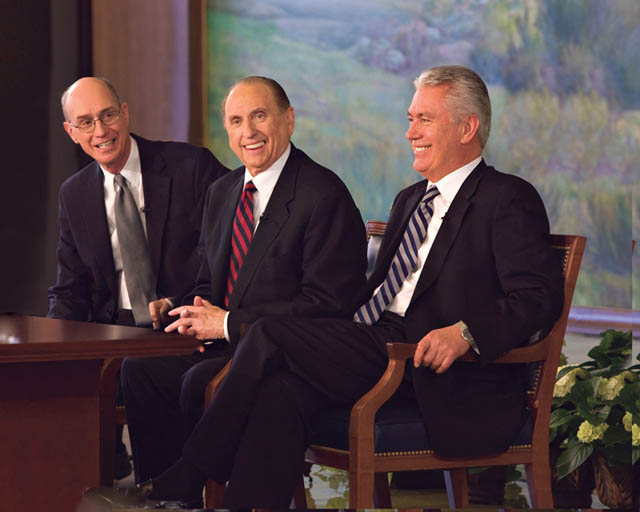Difference between revisions of "Mormon Politics"
Dennisangot (talk | contribs) |
|||
| Line 30: | Line 30: | ||
[[Category:Controversial Topics]][[Category:Mormon Life and Culture]] | [[Category:Controversial Topics]][[Category:Mormon Life and Culture]] | ||
[[pt:A Politica e os Mormons]] | [[pt:A Politica e os Mormons]] | ||
| + | [[es: Políticas Mormonas]] | ||
Revision as of 10:03, 15 March 2011
The Mormon Church or Church of Jesus Christ of Latter-day Saints, according to current policy, remains neutral in matters of party politics in all of the nations in which the Church is operating. This means that the Mormon Church does not endorse, promote, or oppose certain political parties or candidates. It does not allow Church buildings or member lists to be used for political purposes, or attempt to tell its members how to vote. This even applies to situations when a member of the Mormon Church is running for an office. In fact, in the U.S. it is customary for the Church to issue a letter to all of the members before national elections emphasizing the Church's neutrality. While the Church remains neutral, church leaders do try to impress upon members that being an informed voter is a duty that should be upheld. Members are encouraged to study the candidates’ positions and choose a person who they believe shows integrity and will make good decisions.The only time the Mormon Church will speak out on political issues is when there is a moral question involved. Dallin H. Oaks, an apostle in the Mormon Church, explained it this way,
- Some moral absolutes or convictions must be at the foundation of any system of law. This does not mean that all laws are so based. Many laws and administrative actions are simply a matter of wisdom or expediency. But many laws and administrative actions are based upon the moral standards of our society. If most of us believe that it is wrong to kill or steal or lie, our laws will include punishment for those acts. If most of us believe that it is right to care for the poor and needy, our laws will accomplish or facilitate those activities. Society continually legislates morality. The only question is whose morality and what legislation.
People may view this as a violation of the separation of church and state, or may feel that the Mormon Church has no right to speak out on political matters; as Dallin H. Oaks explained,
- Apparently, churchmen can preach morality and religion as long as they do not suggest that their particular brand of religion has any connection with morality or that the resulting morality has any connection with political policies. Stated otherwise, religious preaching is okay so long as it has no practical impact on the listeners’ day-to-day behavior, especially any behavior that has anything to do with political activity or public policy.
As Oaks so blatantly points out, the idea that the Church would not speak out on an issue that involves Mormon beliefs of morality is backwards. The Mormon Church believes that morality and other rules regarding behavior are for the protection of all people and that by adhering to them a person can live a happy, fulfilled life. If the Church did not speak out it would be untrue to the faith.
The Mormon Church "believes in being subject to kings, presidents, rulers, and magistrates, in obeying, honoring, and sustaining the law." Members are encouraged to be responsible citizens of their country, to be informed about issues, and to vote. The Church encourages its members to be engaged in good causes; the Church also teaches that "Governments were instituted of God for the benefit of man." So being active citizens is greatly encouraged. This means that members are strongly encouraged to serve in their communities in areas such as school boards, city councils, state legislatures and other government offices.
The Mormon Church encourages the separation of church and state. This is believed to be essential so that civic laws do not interfere with religious practice and so that religious institutions do not manipulate governments. Mormon teachings state that it is the government's role to protect the individual's freedom to worship "according to the dictates of [his] own conscience" (Articles of Faith 11).
A Prophetic Discourse from Elder Neal A. Maxwell, 1978
References
- True to the Faith (2004), 38–39.
- Dallin H. Oaks, “Religious Values and Public Policy,” Ensign, Oct 1992, 60.
- Article of Faith 12 Pearl of Great Price.
- "Church and State," in Encyclopedia of Mormonism, ed. Daniel H. Ludlow, 4 vols. (New York: Macmillan, 1992), 1:281–82.
- "'No Man's Land': The Place of Latter-day Saints in the Culture War," BYU Studies 38, no. 3 (1999): 145–62.
